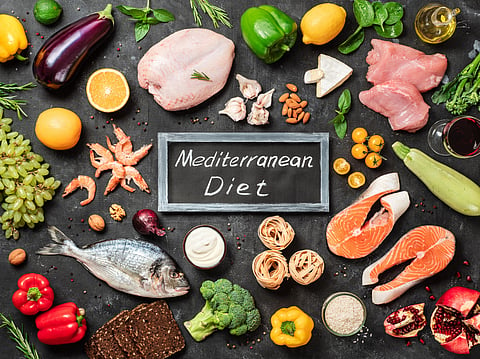THURSDAY, Jan. 26, 2023 (HealthDay News) -- If you're looking for a healthy way to eat that has stood the test of time, the Mediterranean diet may be your best bet.
"There are many health benefits to the Mediterranean diet," said Rahaf Al Bochi, a spokesperson for the Academy of Nutrition and Dietetics. "The Mediterranean diet has been associated with lower risk for heart disease, diabetes, some cancers, and cognitive decline. It is also associated with improved fertility and pregnancy outcomes."
But exactly what is the Mediterranean diet?
"The Mediterranean diet emphasizes plenty of vegetables, fruits, beans, lentils, whole grains, nuts, seeds, olive oil, herbs and spices," Al Bochi said. "Dairy, fish and poultry are consumed a few times a week, whereas red meat and processed meat is enjoyed less frequently."
It also emphasizes mindfulness and enjoyment of food. "Part of that is to be mindful of your body’s hunger and fullness cues, to guide you on the amount of food to be consumed, and that would help you reach your health goals," she said.
"The Mediterranean diet is more than just foods to eat," Al Bochi said. "It is a lifestyle that encourages eating with friends and family, socializing over meals, mindfully eating food and incorporating daily movement."
How to begin the Mediterranean diet
"To get started, focus on one food you can add to your meals and build on that starting point," Al Bochi said.
The American Heart Association says that the Mediterranean diet is a term that describes traditional eating habits in the 16 countries bordering the Mediterranean Sea. While it focuses on healthy eating, it allows for moderate amounts of wine with meals and dessert is OK, though it is usually fruit rather than sweets.
The diet also limits added sugars, sugary drinks, salty, highly processed foods, refined carbohydrates, saturated fats, and fatty or processed meats.
This type of diet has many health benefits, including a big role in helping to prevent heart disease and stroke, by preventing obesity, diabetes, high cholesterol and high blood pressure.
Mediterranean diet health benefits
All that healthy eating translates into better health, experts say.
Some evidence exists that a Mediterranean diet rich in virgin olive oil may help the body remove excess cholesterol and keep blood vessels open, the AHA says.
And commenting on a recent study in the journal Neurology about the benefits of a Mediterranean diet for brain health, Heather Snyder, vice president for medical and scientific relations at the Alzheimer's Association, said the diet might also help ward off dementia.
"When we look at Alzheimer's and cognition and cognitive decline, we have consistently seen diets like the Mediterranean diet are associated with lower risk in later life. What they all have in common is that a balanced diet makes sure your brain has the nutrients that it needs," Snyder said. "I think what we know is what's good for your heart is good for your brain, so eat a balanced diet."
A Mediterranean diet food list
Harvard Health suggests switching from the fats you use now to extra virgin olive oil in cooking, salad dressings and instead of butter. Here are some other foods you want to eat:
Have a handful of raw nuts every day as a replacement for processed snacks.
Add whole-grain bread or other whole grains to your meals. Use dense, chewy, country-style loaves without added sugar or butter. Try bulgur, barley, farro, couscous and whole-grain pasta.
Begin or end each meal with a salad. Choose crisp, dark greens and seasonal vegetables.
Add more and different vegetables to the menu, at least three to four servings a day.
Eat at least three servings a week of legumes like lentils, chickpeas, beans and peas.
Eat less meat, consuming it only occasionally or use it accompanied by lots of vegetables, as in stews, stir-fries and soups. Eat two to three servings of fish and poultry a week.
Drink a moderate amount of wine instead of other alcoholic beverages. Replace beer or liquors with wine. (Two 5-ounce glasses per day for men, and one glass per day for women.)
Cut out sugary drinks. Replace soda and juices with water.
Eat fewer high-fat, high-sugar desserts, and instead enjoy poached or fresh fruit. Save cakes and pastries for special occasions.
Get the best quality food available.
SOURCE: Rahaf Al Bochi, RDN, LD, Olive Tree Nutrition, spokesperson, Academy of Nutrition and Dietetics




